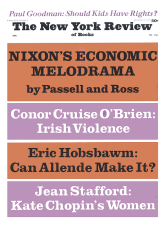In response to:
Out of Order from the May 20, 1971 issue
To the Editors:
Considering the quantity of material Mr. Christopher Ricks was asked to dispose of in his review of five of my books (NYR, May 20), its variety, and its occasional complexity, he really did quite well. To be sure, he made a number of blunders, as was to be expected. I should appreciate your indulgence in discussing briefly but one, because it is symptomatic, important, and common. Mr. Ricks remarks, “Peckham’s theory is (rightly and inevitably) evaluative…. Peckham would still…need to reckon with the possibility that some works of art are greater (adaptationally better) than others….” My students often leap at this conclusion when they have yet to grasp my position. The correct consequence of my thesis is different: the higher the cultural level at which the individual is performing the greater the probability that he will ascribe positive value to works with a high degree of discontinuity, i.e., perceptual disorder. This thesis has been sustained by experimental studies.
I draw attention to this because I believe it to be an error that a theory of art is “rightly and inevitably evaluative.” (1) Any proposition can be used as a basis for judging art. (2) An indefinably wide range of propositions has so been used, and new ones will be thought up. The process will continue as long as there are people and art, and the question cannot be resolved. (3) So to use a proposition is to judge art on the basis of whether or not it is an exemplification of a proposition. Such activity ascribes to art a lesser value than the propositions used to judge it. Individuals intensely concerned with evaluating works of art appear to have as their central interest the severe restriction of the number of works of art to be taken seriously. (4) We judge art because we judge everything else. Value judgments of works of art are of great interest sociologically, but of little or no interest in understanding works of art.
Morse Peckham
University of South Carolina
Columbia, South Carolina
This Issue
September 23, 1971



